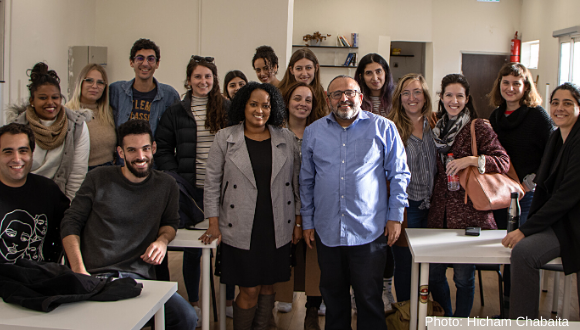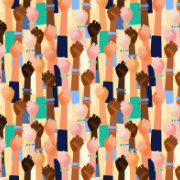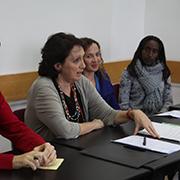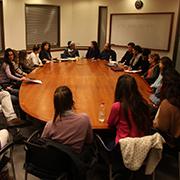Our Impact
2014
- Human Rights: Preventing discrimination on the basis of sexual orientation. The District Court in Tel Aviv accepted an appeal filed by the Human Rights Clinic on behalf of The Aguda - The Israeli National LGBT Task Force, stating the "Makor Rishon" newspaper's refusal to publish an ad about The Aguda's Crisis Hotline constitutes illegal discrimination and is a distinct violation of the Anti-Discrimination in Products and Services Law. "Makor Rishon" was imposed to compensate the Taskforce in the amount of NIS 50,000 in addition to legal fees in the amount of NIS 10,000. (January 2014)
2013
- Refugees: The Supreme Court Invalidates an Amendment to the Infiltration Prevention Law. The Refugee Rights Clinic, in conjunction with several human rights organizations, filed a petition against the constitutionality of the amendment that allows the incarceration of asylum seekers from Africa for up to three years.
On September 16, 2013 a panel of nine judges unanimously accepted the petition and ruled that the law violates basic human rights, was unconstitutional and was to be immediately void.
The court ordered the state to re-examine the cases of all those incarcerated under the provisions of the law within 90 days. (September 2013)
- Human Rights: Protecting freedom of speech. The clinic represented journalist and activist (Gideon Spiro) who was detained following an article he published in which he criticized settlements in the West Bank. Following the article's publication, the Legal Forum for the Land of Israel demanded to investigate the publication. Following an exchange between the Forum and the attorney general's, the latter decided to investigate Spiro on suspicion of incitement and violence, and detained him – nine months after the article was published. In our suit we claimed that Sprio was wrongfully imprisoned. The parties reached a settlement and Spiro was compensated in the sum of ten thousand NIS.
- Environment: Libel SLAPP suit - protecting freedom of expression of environmental activists in Israel. The Environmental Justice Clinic won an appeal in which it represented an environmental activist sued for libel by a recycling corporation due to criticism he expressed regarding the corporation's conduct. In its ruling, the court stated that isseemed the corporation specifically targeted the appellant who was persistent in his criticism. The appellate court overturned a lower court decision finding the activist responsible for libel. , In addition, all legal costs were imposed on the corporation.
The importance of the case lies in the ability to address the growing phenomenon of SLAPP suits (Strategic litigation against public participation), which are used to intimidate and silence social activists from acting and critiquing human rights and environmental rights violations. (February 2013)
- The Housing, Community and Law Clinic wins The Emile Zola Human Rights Prize for its innovative work and contribution to the wellbeing of Jews and Arabs in Jaffa. The prize is awarded annually by The Emile Zola Chair for Interdisciplinary Human Rights Dialogue, at the Striks School of Law, the College of Management - Academic Studies (COMAS) (September 2013).
2012
- Refugees: Ending the educational segregation of asylum seekers' children in Eilat. The Be’er Sheva District Court accepted a petition by the Refugee Rights Clinic (RRC), Assaf NGO and the Hotline for Migrant Workers against the segregation of asylum-seeker children in a separate educational facility in the southern city Eilat. The court ordered to integrate the children into the regular school system in the city. Both the Eilat Municipality and the Ministry of Education appealed the decision to the Supreme Court, but the appeal was rejected by the court, stating that the Supreme Court would not approve segregation of children based on their origin. (August 2012)
- Refugees: Adaptation of the asylum interview for disabled asylum seekers. Following a petition by the Refugee Rights Clinic against the Ministry of Interior, the case of a Rwandan asylum seeker (a torture victim and genocide survivor), was reopened and an additional interview with the necessary adjustments was granted.
The importance of this case lies in the fact that it was the first case interpreting the right of people with disabilities and of victims of torture for adequate procedures in the Refugee Status Determination (RSD) process.
- Holocaust Survivors: Changing the calculation method for determination of disability under the Victims of Nazi Persecution Law: Following a petition by the Holocaust Survivors Rights Clinic, the court ordered the Holocaust Survivors Rights Authority (HSRA) to change and compare their calculation method for determining disability percentage, to that of the National Insurance Institute (NII), which results in a higher disability rate and pension, thus positively affecting all survivors receiving compensation from the HSRA.
- Human Rights: The Right to Review Court Rulings of Religious and Family Courts: Following a petition by the Human Rights Clinic, regulations for all courts dealing with personal status (Family Courts; Sharia, Rabbinical and Druze Tribunals), have been amended so that reviewing their judgments is exempt from any toll.
The importance of the decision is that it increases transparency of the judicial process, and promotes the ability of vulnerable populations, especially women, to better exercise their rights and explore rulings for predisposed/biased trends, fight such discriminatory trends and eliminate them. (February 2012)
- Community Economic Development: Supporting Girls and Young Women at Risk. Through a unique cooperation with the Women's Courtyard NGO, the Micro Business and Economic Justice Clinic orchestrated all legal aspects of a first of its kind social business. The business - a shop selling fashion brands surplus – is designed to help in the professional and vocational training of girls living on the margins of society. It opened to much success at the Jaffa Port, and employs some eight girls who work in shifts, and are accompanied by a social worker. (April 2012)
- Employment Rights: In a Precedent-Setting Court Ruling, the Regional Labor Court declared the struggle of contract workers for direct employment by the institution commissioning their services "a legitimate struggle sheltered under the freedom of association", which does not justify dismissal. Therefore the court overturned the worker's dismissal, ordering to reinstate her into the position from which she was fired. The case was litigated by the Workers' Rights Clinic. (March 2012)
- Human Rights: The State Overturns Decision of a Regional Admission Committee. On behalf of a young couple rejected from joining a settlement in the Negev, the Human Rights Clinic filed a petition challenging the legality of the 'Admission Committees Act'. In the wake of the petition filing, the Israel Land Authority (ILA) revoked the admissions committee decision and the petition was withdrawn.
2011
- Environment: The Right to a Smoke-Free Prison Cell. Following a petition filed by the Environmental Rights Clinic on behalf of the Israel Cancer Association and Physicians for Human Rights (PHR), against the Israeli Prison Service (IPS), the IPS issued regulations whereas smoking will be one of the factors when assigning a prisoner to a cell (examples of other factors include: type of crime, minor/adult, religious/non-religious).
- Human Rights: Discrimination based on Gender Identity. The Human Rights Clinic represented a transgender migrant worker from Sri Lanka who was humiliated during a police investigation after being arrested in suspicion of theft. Investigators used vulgar language, asked offensive questions regarding his sexual identity and genitalia, and finally demanded he undress and display his intimate parts. In a judgment that gave force to a settlement between the parties, the plaintiff was compensated in the sum of 15,000 ILS. (December 2011).
- Employment Rights: Compensation for Systematic Dismissal every Nine Months. A lookout with the Israel Railroad Company who was employed through a contractor, was dismissed every nine months as part of a policy aimed at preventing the accumulation of rights at the workplace. In a precedential lawsuit under these circumstances, the Court accepted the arguments presented by the Workers' Rights Clinic, ruling such dismissal as unlawful, being contrary to the obligation of good faith, to the sector's collective agreement, and to the obligation to grant a hearing (before dismissal). The plaintiff received compensation for unlawful dismissal as well as additional monetary rights. (July 2007)
2009
- Human Rights: Discrimination against Arab Citizens. In cooperation with other organizations, the HRC represented Arab railway workers who were dismissed due to Israel Railways' new policy requiring army service as an employment condition (note: Arab citizens are exempt from serving in the Israeli army). The court ordered Israel Railways to change its policy. The workers were reinstated into their jobs.
- Refugees: Right to Family Life. In a case litigated by the Refugee Rights Clinic, the Jerusalem Administrative Court ruled that a recognized refugee has the right to family life and is entitled therefore to sponsor his partner for legal status in Israel.
2008
- The Refugee Rights Clinic receives the Emil Grunzweig Human Rights Award presented annually by the Association for Civil Rights in Israel (ACRI). The award committee wrote: "The program is a pioneer in everything relating to one of Israel’s worst failures concerning human rights - the lack of policy for the treatment of refugees… The Refugee Rights Clinic… operates from within an academic institution and provides an effective expression to the way the 'ivory tower' does not confine itself to the limited boundaries of academic research, but harnesses academic power and student energies to confront an actual human crisis, far away from the lecture halls or the research classes."
- Economic Justice. The Micro Business and Economic Justice Clinic successfully campaigned for a change in Israel's welfare regulation that now allows welfare recipients who are starting their own business to receive income support for another 18 months after the beginning of their economic activity. Before the change, micro-entrepreneurs lost their welfare allowances immediately after they had established their business.
2007
- Employment Rights: The Right to Organize: The Workers' Rights Clinic provided substantial legal support and infrastructure to Koach La Ovdim - Democratic Workers' Organization during its founding period. The establishment of a new, independent general trade union marks a historic event for labor in Israel.
- Human Rights: High Court of Justice: "Every Prisoner is Entitled to a Bed". Following a petition by the Human Rights Clinic on behalf of Physicians for Human Rights (PHR) and the Association for Civil Rights in Israel (ACRI), the Supreme Court confirmed the right of all detainees in Israel to have a bed to sleep on and instructed the Prison Service to immediately stop bedding prisoners on the floor. "When a person enters prison – he is denied his freedom, but is not deprived of his dignity" Hon. Ayala Procaccia. (July 2007)
2006
- Migrant Workers' Rights. In a petition submitted by the then Welfare Rights Clinic, the Supreme Court ordered the state to allow migrant workers to change employer. The Court stated that the current employment scheme was unconstitutional, deeming it ‘modern slavery’, as it turned migrant workers from subjects to objects of the law.
- Contract Workers Rights - a precedent-setting court ruling in a case litigated by the then Welfare Rights Clinic declared that an institution/third party commissioning services from a contracting company is responsible for payment of the contract worker's rights, even though they do not have employer - employee relations.
- Refugee Rights. Following a petition to the Supreme Court by the Refugee Rights Clinic on behalf of the Hotline for Migrant Workers challenging the practice of administrative detention of refugees without periodic judicial review, over 400 Sudanese asylum seekers were released from prison after their cases had been reviewed by a newly-appointed internal advisor.
2005
- Gay and Lesbian Rights: The right of same sex couples to inherit from their partners, even if they do not leave a will, was recognized by an Israeli court and by the Attorney General. The case was litigated by the Human Rights Clinic.
- Amendment to the Freedom of Information Act: Following a petition filed by the Environmental Justice Clinic to the Supreme Court on behalf of Citizens for the Environment in the Galilee, the Ministry for Environmental Protection issued regulations requiring public authorities to publish information regarding hazardous substances emitted to the environment. Furthermore, the court imposed legal costs on the ministry.
2003
- Rights of People with Mental Disabilities: The right of people with mental disabilities to legal representation in involuntary commitment hearings was recognized in a case handled by the Human Rights Clinic.
2001
- Right to Water: A case litigated by the then Jaffa Community Law Clinic led to a new policy that forbids disconnecting water from poor families who cannot afford to pay their water bills. However, until today, enforcement remains incomplete.
2000
- Right to Health: As a result of legal advocacy conducted by the Environmental Justice Clinic, the government was ordered to approve a new program to solve a sewage problem that harmed the health and environment of Bedouin citizens in unrecognized villages.
1995
- Right to counsel: Under the academic supervision of Prof. Kenneth Mann, the Criminal Justice Clinic (that was founded by Prof. Mann in 1989) served as a model and catalyst for the establishment of the National Public Defender's Office in Israel. Prof. Mann later became Israel's first Chief Public Defender from 1996 to 2002.





